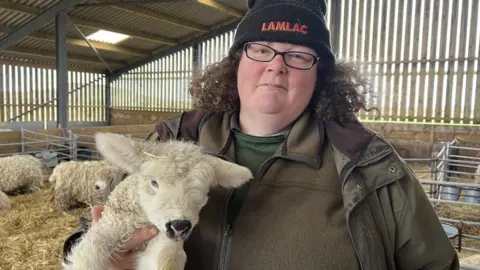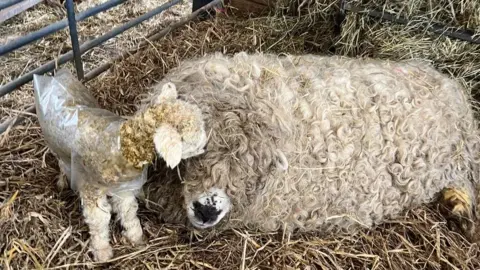Lamb virus causing deformities in 'worst year', Somerset farmer says
 BBC
BBCSheep farmers are calling for more support to help them battle a virus which causes lambs to be born deformed.
The Schmallenberg Virus (SBV) has affected farms in Somerset with cases rising across the West.
Sadie Champion, a farmer on the Somerset Levels near the village of Mark, said it's been the "worst" outbreak in 26 years.
The Animal and Plant Health Agency (APHA) said a vaccine has been developed.
Ms Champion told BBC Radio Somerset: "We had one particular ewe who struggled to give birth to a lamb because it was so badly deformed.
"The ewe survived fortunately, but the lamb was stillborn. It was rough on all of us.
"With these being rare-breed sheep, every single lamb counts. Every loss is a big hit to our farm."

The Schmallenberg virus is transmitted by midges that bite an infected animal and then go and bite another animal, passing the virus on.
There were earlier outbreaks of the disease in 2012 and 2017.
Some farmers across the South West are reporting 40% of their flock are infected, according to the National Sheep Authority.
Symptoms include reduced milk production, fever and diarrhoea.
'Bad year this year'
Phil Stocker, from the National Sheep Authority said: "We are seeing a high number of cases across the south-west belt of England, right away from Devon and Somerset through to Herefordshire and Gloucestershire.
"It's certainly a bad year this year. It tends to go in three to five-year cycles.
"There is a vaccine that is licenced, but it is really difficult to get it manufactured when they are not confident there will be uptakes of the vaccine.
"But there are more farmers this year that are saying 'if there was a vaccine, we would use it'."
An APHA spokesperson said: "While infection with Schmallenberg virus is not reportable, we encourage farmers to vigilant for the signs of this disease and to contact their vet if they have any concerns."
The spokesperson added that a vaccine had been authorised for use in the UK in 2015, but it needed the farming industry and pharmaceutical companies to work together to bring it to market.

Follow BBC Somerset on Facebook and, X. Send your story ideas to us on email or via WhatsApp on 0800 313 4630.